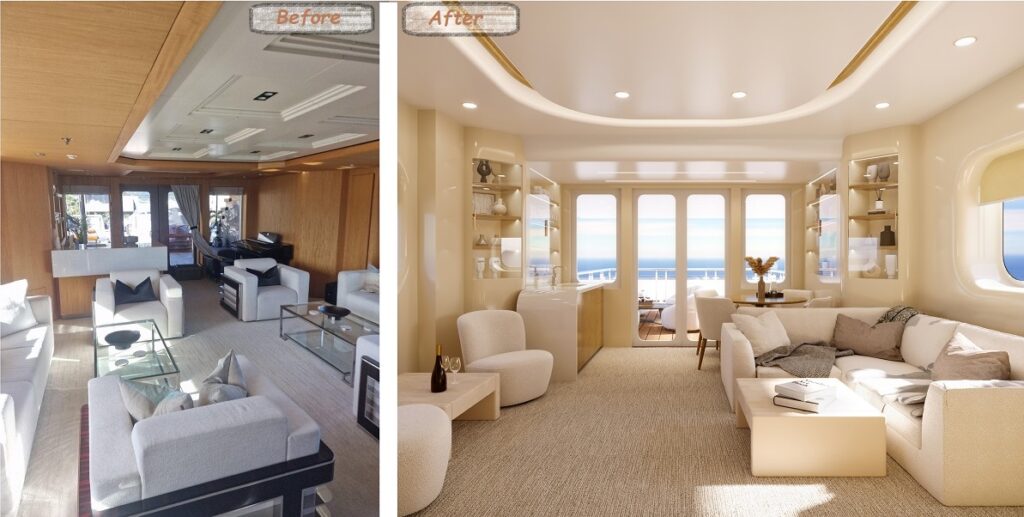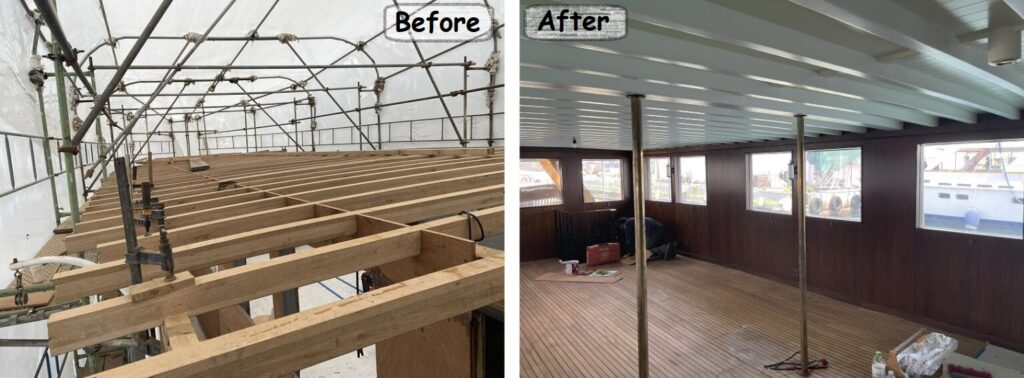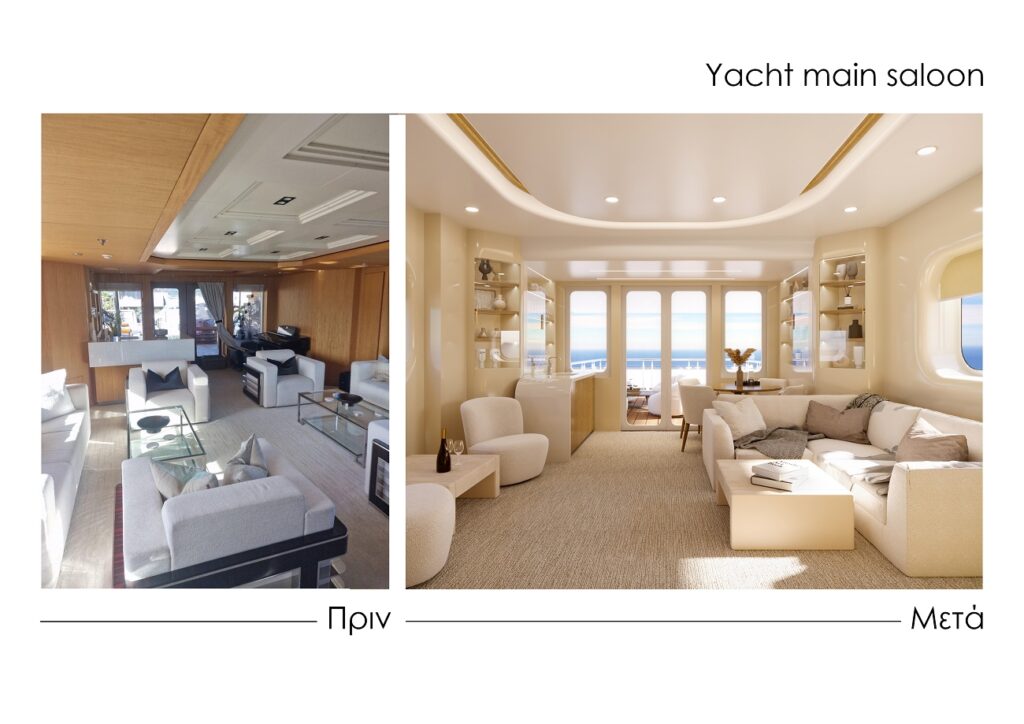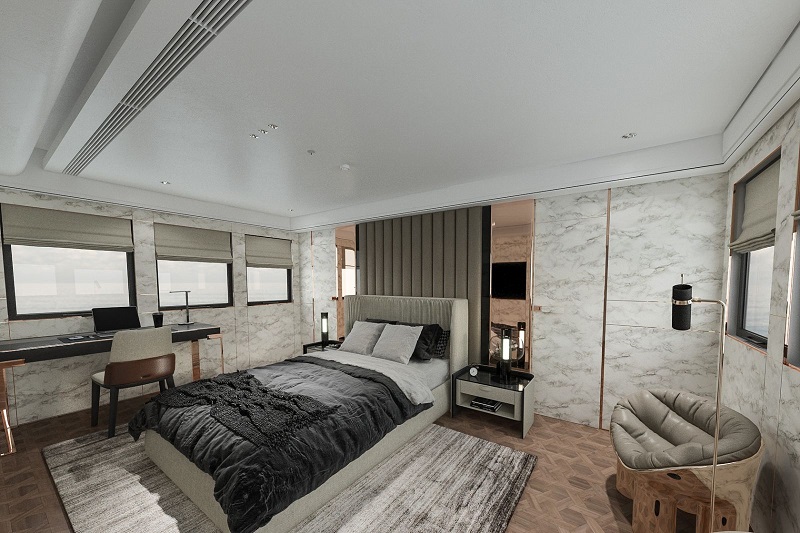Renovating a yacht is a unique and exciting process, combining the charm of nautical living with the desire for modern comforts. Whether you’re looking to update your yacht for personal use or preparing it for charter, a successful renovation requires careful planning and attention to detail. Here’s your ultimate guide to planning a yacht makeover that turns your dream vessel into reality.
Define Your Goals
The first step in any renovation is to clarify your goals. Do you want to create a luxurious retreat with all the latest gadgets? Are you looking to enhance the yacht’s functionality for long-term cruising? Or perhaps you want to prepare the yacht for chartering, improving both aesthetics and performance.
Understanding your end goal will help guide decisions throughout the project. Consider aspects like:
- Functionality: Will the yacht be used for short trips, extended cruising, or commercial purposes?
- Style: Do you prefer a traditional, classic nautical look or a modern, sleek, and minimalist design?
- Budget: Determine a realistic budget for the project, keeping in mind that yacht renovations can range from simple cosmetic updates to extensive overhauls.

Consult Professionals
A yacht renovation is not something to take on alone. The scope of work often involves intricate details, and professional expertise is essential. Hiring the right professionals will ensure your yacht is not only stylish but safe and fully functional.
Here’s a list of experts to consult:
- Naval Architects: For design and structural modifications.
- Interior Designers: Specializing in marine spaces, they can transform your yacht’s interiors while ensuring comfort and safety.
- Marine Contractors: For construction, repair, and technical installations.
- Surveyors: To assess the yacht’s condition and provide insights into what needs renovation or improvement.
Set a Realistic Budget and Timeline
Renovating a yacht can be costly, and the timeline may vary based on the extent of the makeover. The key is to establish both a budget and a timeframe that are realistic for your renovation goals.
- Budget: In addition to the upfront costs, consider potential unexpected expenses such as repairs or upgrades to systems like plumbing or electrical. A contingency fund of about 10-20% of the total renovation cost is always wise.
- Timeline: Renovation timelines can vary widely. A simple refresh could take a few weeks, while a full remodel could take several months. Be prepared for delays, especially when dealing with custom materials or international shipping.
Interior and Exterior Design
Interior Design: Creating a Comfortable, Stylish Space
When it comes to interior design, a yacht’s space is often more compact than a home, which means careful planning is needed to make the most of every square foot. The interior must balance aesthetics with functionality to provide comfort and efficiency, whether you’re cruising for the weekend or embarking on a long journey.
1. Layout and Space Optimization
On a yacht, the layout is crucial for maximizing space. Even if the yacht is small, strategic design can create the illusion of more room. Here are some tips:
- Open Concept Living Areas: Using open-plan designs for areas like the saloon, galley (kitchen), and dining room helps create a feeling of spaciousness. A flowing design can visually connect different parts of the yacht, making it feel less cramped.
- Multi-functional Furniture: Choosing furniture pieces that serve multiple purposes is vital. For example, a sofa that doubles as a bed or storage compartments built into the seating can make a big difference.
- Vertical Space: Maximizing vertical space is important on a yacht. Custom cabinetry or shelving can make the most of every inch, and higher ceilings or the use of mirrors can also help to open up the space.
2. Materials and Finishes
The materials you choose will play a significant role in the yacht’s aesthetic and durability. You want materials that can withstand the harsh marine environment (saltwater, humidity, and UV exposure) while still looking beautiful. Here are some key materials commonly used:
- Teak and Mahogany: Teak is a traditional material used for yacht interiors due to its resistance to water and its elegant look. Mahogany offers a similar classic aesthetic but with a deeper red tone.
- Marine-Grade Upholstery: High-quality fabrics that resist mildew, mold, and fading are crucial in marine environments. Materials like Sunbrella or other marine-grade upholstery fabrics are durable, comfortable, and come in a variety of colors and textures.
- Leather and Vinyl: Leather adds a luxurious touch, and vinyl can be a good option for more practical, durable furniture that can handle the wear and tear of life on the water.
- Stainless Steel and Aluminum: For fixtures, handrails, and fittings, stainless steel is an excellent choice due to its durability and resistance to corrosion. It’s often used in kitchens, bathrooms, and deck areas.

3. Lighting and Ambience
Lighting plays a pivotal role in creating the right atmosphere on a yacht. You want lighting that is functional for navigation and operations, but also sets a mood for relaxation and enjoyment.
- LED Lights: Energy-efficient, long-lasting LED lights are commonly used on yachts. These can be integrated into various parts of the yacht, from reading lights above the beds to ambient mood lighting in the lounge.
- Natural Light: Incorporating windows and skylights helps to bring in natural light, which is especially important on a yacht. This not only enhances the feeling of space but also allows passengers to enjoy the views of the ocean.
- Accent Lighting: Accent lighting, such as under-counter or under-deck lights, can highlight the design features of the yacht, like wood paneling or artworks, while adding a modern touch.
4. High-tech Features
Many yacht owners are integrating cutting-edge technology to enhance the onboard experience. Some popular technological upgrades include:
- Smart Home Systems: Control systems for lighting, air conditioning, and entertainment systems that can be controlled via smartphones or tablets.
- Integrated Audio-Visual Systems: High-end sound systems, projectors, and large flat-screen TVs are becoming common in luxurious yacht renovations, ensuring that guests enjoy entertainment on the water.
- Advanced Climate Control: On larger yachts, air conditioning and heating systems are important to maintain comfort regardless of weather conditions.
Exterior Design: Maximizing Aesthetics and Performance
While the interior of a yacht is crucial for comfort, the exterior design is what people see from afar and also influences the yacht’s performance. The exterior must be both beautiful and functional, with a focus on aerodynamics, stability, and durability.
1. Hull and Paint
The hull is one of the most important aspects of yacht design, affecting both aesthetics and performance.
- Color: The color of the hull is one of the first things people notice. Classic white is timeless, but bold colors like navy, deep red, or even metallic finishes are increasingly popular.
- Finish: A sleek, glossy finish not only makes the yacht look stunning but also reduces water drag. High-quality marine paints, such as Awlgrip, are commonly used because they are resistant to UV damage and saltwater corrosion.
- Maintenance: Regular maintenance and care for the hull, especially if it’s a painted surface, are necessary to keep it looking pristine. This can include waxing, polishing, and buffing the exterior regularly.
2. Deck Design and Layout
The deck is where most outdoor activities take place, so it must be designed for both aesthetics and functionality.
- Lounge Areas: Incorporate comfortable seating areas with sunbeds, outdoor sofas, and tables. You can also add a bar area or an outdoor dining space for entertaining guests.
- Storage: Effective storage solutions are essential on the deck for things like tenders, water sports equipment, and safety gear. Custom storage units integrated into the deck are a good way to keep the space clean and clutter-free.
- Outdoor Kitchen/Bar: Many modern yachts feature outdoor kitchens or bars for an enhanced dining experience at sea. These are great for hosting parties or enjoying casual meals with family and friends.
3. Performance Enhancements
In addition to aesthetics, the exterior design can also be tailored to improve the yacht’s performance. Upgrading elements like:
- Engines and Propulsion Systems: This can significantly impact speed, fuel efficiency, and stability. Opting for more fuel-efficient engines or cutting-edge propulsion technologies can enhance your yacht’s performance.
- Stabilizers: Adding gyroscopic or fin stabilizers will improve comfort by reducing roll in rough waters.
- Solar Panels and Energy Systems: Many yacht owners are now choosing eco-friendly designs that incorporate solar panels or hybrid power systems, which can reduce fuel consumption and the environmental impact of the vessel.

The Bow and Stern: Key Features for Luxury
The bow and stern are essential areas of yacht design, impacting both aesthetics and functionality.
- Bow Design: The front of the yacht can feature a large, open space for lounging and sunbathing, complete with plush cushions and chaise lounges.
- Stern Design: The rear of the yacht is often used for entertainment or docking. Expansive swim platforms, a hydraulic tender lift, or an outdoor dining area can enhance the luxury experience on the stern.
Legal and Regulatory Considerations
Before you begin your renovation, it’s crucial to understand the legal requirements involved, as yachts are subject to various regulations depending on where they are registered and where they will be used.
- Permits and Compliance: Depending on the type and scope of the renovation, you may need to obtain permits, especially if you’re altering the structure or systems of the yacht.
- Safety Standards: Ensure that any upgrades or modifications comply with safety regulations. This includes fire safety, emergency equipment, and stability requirements.
Additionally, if your yacht is registered in a specific country or is used in international waters, there may be unique legal requirements that must be met.
Sourcing Materials and Equipment
For yacht renovations, sourcing the right materials is key to both aesthetics and performance. Work with trusted suppliers who specialize in marine-grade products, including:
- Teak and Mahogany for decking
- Marine upholstery for furniture
- Stainless steel fittings
- High-performance fabrics and carpets
Consider working with a supplier who can provide high-quality materials that are resistant to saltwater, UV rays, and other elements.
Hiring the Right Crew
The crew you employ during the renovation process can make a significant difference in how smoothly the project goes. Ensure that you hire professionals who have experience specifically with yacht renovations, as this requires unique knowledge and skills. Depending on your needs, you may need specialists such as:
- Marine electricians
- Fiberglass technicians
- Upholsterers
Choose a team that can work efficiently together and communicate clearly with you about your expectations and progress.

Launch and Post-Renovation Care
Once the renovation is complete, you’ll want to ensure the yacht is fully ready for use. Have your crew conduct thorough tests of all systems, from plumbing and electrical to navigational equipment. A final inspection from a certified surveyor will also ensure everything is up to standard.
Even after the renovation is done, regular maintenance will be required to keep your yacht in top condition. Consider setting up a maintenance schedule for the exterior, systems, and interior.
Final Thoughts
A yacht renovation is an investment in luxury, comfort, and performance. With proper planning, the right team, and clear goals, you can transform your vessel into the yacht of your dreams. Whether you’re upgrading for personal enjoyment or preparing for charter, careful attention to detail and craftsmanship will ensure your yacht remains a treasured asset for years to come.
